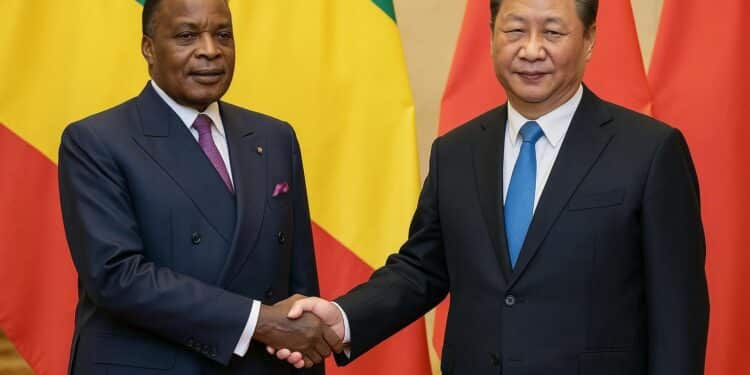Strategic ties enter pragmatic phase
The Chinese ambassador to the Republic of Congo, An Qing, returned from Oyo impressed by what she called the town’s “dynamism and vitality”. Her remarks underscored a broader diplomatic message: Beijing and Brazzaville now see their cooperation as a joint journey toward sustainable, high-quality growth.
Officials on both sides describe the relationship as mature yet forward-looking. They argue that the coming half-decade offers a unique window to align large-scale Chinese capabilities with Congolese priorities, from infrastructure renewal to human-capital development, without compromising fiscal stability or policy autonomy.
Ambassador An Qing’s development pitch
Addressing local media, An Qing highlighted China’s economic metrics to illustrate what sustained reform can deliver. She cited a 5.5 percent average growth rate, a near-30 percent contribution to global expansion and leading positions in goods and services trade—figures intended to reassure partners of China’s depth of experience.
The diplomat’s core message was that modernisation is replicable when adapted to context. She framed China’s own transformation—from poverty to the world’s largest developing economy—as evidence that determined policy implementation, rather than geography, explains success. Congo, she suggested, can harness similar momentum through disciplined, long-term planning.
President Sassou Nguesso applauds roadmap
President Denis Sassou Nguesso welcomed the ambassador’s assessment, calling China’s trajectory “exemplary” for emerging states. His endorsement signals continuity in Brazzaville’s foreign-policy orientation: deepening commercial and technical links with Beijing while maintaining diversified international partnerships.
The presidential message also served domestic audiences. By spotlighting a proven external model, the head of state reinforced his administration’s narrative that Congo’s own reforms—whether in public finance, digitalisation or agro-industry—belong to a broader global trend favouring pragmatic development over ideology.
Modernisation with local flavour
An Qing stressed that no single recipe fits all. Instead, each nation must design a modernisation path “suited to its national realities”. For Congo, that may mean sequencing transport corridors, power supply upgrades and vocational training in ways that maximise employment while respecting budget ceilings.
The ambassador invoked a Chinese proverb: “No one can return to isolation under the same sky.” The metaphor captured Brazzaville’s aspiration to stay connected to supply chains and capital flows, even as global trade patterns shift. In practice, such connectedness requires predictable regulation and transparent procurement—areas investors watch closely.
Putting people at the centre
Beijing’s envoy linked macro success to grassroots outcomes. Modernisation, she said, must guarantee quality education, decent jobs, equitable income distribution and equal access to public services. These benchmarks reflect both Chinese policy experience and Congolese social priorities, especially youth employment and rural inclusion.
For policymakers in Brazzaville, the message reinforces ongoing programmes aimed at widening healthcare coverage and expanding technical institutes. The promise is tangible: if growth under the Sino-Congolese partnership translates into everyday improvements, public support for reform and openness is likely to strengthen.
Navigating headwinds of protectionism
The diplomat cautioned against rising unilateralism and protectionist practices that could fragment markets. She positioned China as “firmly on the side of fairness, justice and impartiality”, echoing themes common in multilateral forums.
Congo shares that stance, advocating balanced trade rules that allow commodity-exporting countries to climb value chains. For investors, a rules-based environment lowers risk, while diversified export markets mitigate price shocks. Both partners thus frame their alignment as a hedge against geoeconomic volatility.
FOCAC as institutional backbone
China and Congo co-chair the Forum on China–Africa Cooperation, giving Brazzaville a privileged platform to shape continent-wide agendas. Past FOCAC cycles generated concessional credit lines and technical assistance; upcoming editions are expected to focus on green infrastructure and digital connectivity.
Maintaining that momentum requires rigorous project selection and impact monitoring. Officials hint that a joint committee may streamline approvals, shorten disbursement times and ensure projects meet sustainability benchmarks. Such procedural clarity would appeal to development finance institutions seeking co-financing opportunities.
What this means for investors
The convergence of diplomatic vision and socio-economic goals signals actionable opportunities in sectors aligned with Congo’s reform roadmap: energy transition, transport, agro-processing and telecoms. Chinese firms bring scale and cost advantages, while Congolese authorities offer tax incentives under updated investment codes.
Yet, success will hinge on transparent governance, local content strategies and sound debt management. As the ambassador noted, modernisation should “benefit every household”. Translating geopolitical goodwill into bankable projects therefore requires disciplined execution, community engagement and adherence to international ESG standards.












































